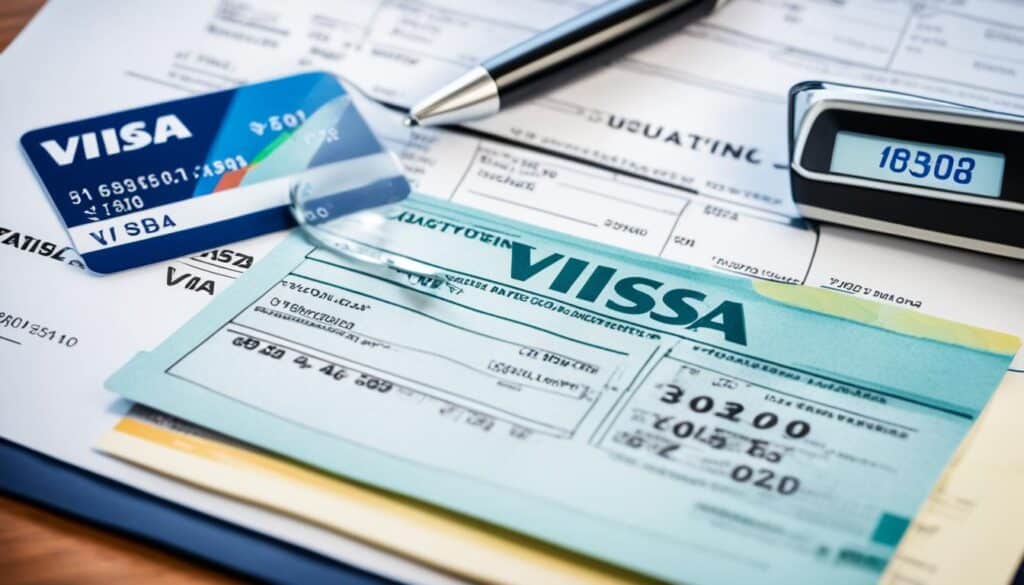Understanding tax deductions on visa expenses can be complex. It all depends on if you are a resident alien or nonresident alien. The type of visa costs also matters, dictated by your residential status.
Your residential status and visa types are key. For residents and non-residents alike, knowing about the “green card test” or “substantial presence test” is vital. This determines how visa expenses can be claimed on your taxes.
When looking at visa expenses, consider several factors. These include the tax year, your ID number, and how you file your taxes. If you’re from Canada, tax treaties also come into play.
The U.S. system runs on paying taxes throughout the year, not just at tax time. This means you need to keep up with your tax withholdings and filings.
Key Takeaways
- Visa expenses can be complex when evaluating tax deductibility.
- Your residential status plays a crucial role in determining what counts as a tax write-off for visa expenses.
- Depending on whether you’re a resident alien or a nonresident alien, the tax implications can vary significantly.
- Consider the tax year, taxpayer identification, filing status, and possible tax treaties when assessing visa fees tax deduction eligibility.
- The U.S. taxation system’s “pay as you go” principle requires careful planning and regular updates to your tax withholdings.
- For Canadians, dual filing and specific tax treaties might impact how visa expenses are treated for tax purposes.
- Always keep thorough documentation to substantiate any claims regarding visa expense deductions.
Understanding Visa Expenses and Tax Deductions
Visa expenses can come from various areas like travel, education, or work. The big question is: are visa expenses tax deductible? Let’s dive into this topic to make it clearer for you.

What Are Visa Expenses?
When we talk about visa costs, we’re looking at things like application or legal fees. If these costs relate to making money or working in the U.S., they might be deductible. However, the rules can get complex. Your residency and the type of visa can change what you can deduct.
General Rules on Business Expense Deductions
For an expense to be deductible, it has to be both usual and needed. Keeping good records is essential. The IRS wants to see why you think a cost is related to your income. So, when thinking about your visa, it should link directly to how you make money. Business visa costs usually qualify, but not fun travel expenses.
Your residency status is a key factor in deducting visa costs. Different rules apply to whether you’re a resident or not. And, there are even special rules for some countries, like Canada. Students, dependents, and those living abroad all have their own tax situations. Knowing these details helps with your taxes.
Navigating Tax Treaties: Tax treaties can also change things. For Canadians, this might mean having to file taxes in two countries. In certain cases, visa costs might be tax-deductible because of these treaties.
Are Visa Expenses Tax Deductible?
The IRS has clear rules on deducting visa expenses. If you can link these costs directly to making money in the U.S., they might be tax-deductible. This is especially important for nonresident aliens. They pay taxes on U.S. earned income.
In some cases, you can’t deduct certain incomes like stipends or scholarships. How the IRS sees your residency also matters. This depends on the substantial presence test. It looks at the time you’ve spent in the U.S. This affects your tax situation.
Leaving the U.S. raises different tax issues. The expatriation tax is one to watch. Knowing these laws is key for your financial plans. International tax treaties, like the U.S.-Canada one, can lead to specific tax benefits for Canadians.
Claiming visa expenses on taxes is tricky. Being well-informed is smart. It’s best to review IRS info or talk to a tax expert. They can help you get all the tax breaks you are eligible for.
Claiming Visa Expenses on Your Taxes
Understanding how to claim visa expenses on your taxes is key. It’s crucial to have the right documents and know what costs can be deducted. Let’s make this guide fun and simple to follow.
Documentation Needed for Claiming Visa Expenses
Keeping good records is vital to claim visa expenses. You should save:
- Receipts for visa application fees and related costs
- Travel itineraries that show business or income-generating trips
- Contracts or employment agreements that connect visa costs to job needs
- Forms like 8843 (for exempt persons) or 8840 (for those with closer foreign ties)
Examples of Deductible Visa Costs
Curious about which visa expenses are deductible? A few might qualify, like:
- Visa application and processing fees for work or business
- Business travel that meets IRS guidelines for being essential
- Legal fees for a work visa
It’s smart to keep detailed records of visa expenses with strong evidence. This makes your case stronger, showing these costs are key for your U.S. career. Talking to a tax expert can also help, especially for tricky tax situations. Remember, clear record-keeping is crucial for getting tax deductions.
Conclusion
Understanding if you can subtract visa costs from your taxes in the U.S. can be tricky. It all comes down to the tax code, your status as a resident or nonresident, and how the expenses help make money. The IRS’s Publications 519 and 525, and the U.S. Tax Guide for Aliens give key info for aliens. Reviewing your visa type and costs according to IRS rules is crucial to decide if you can deduct them.
The main question is: are visa expenses tax deductible? The answer changes based on your visa, why you’re in the U.S., and the papers you have. If you’re working or doing business here, some costs may be deductible. Always check that these costs are normal, needed, and clearly recorded to avoid problems.
With tax laws always changing, getting advice from a tax expert is smart. They can guide you through the complex rules for expatriates, international students, and Canadians working in the U.S. Keeping detailed records and understanding tax treaties is key to knowing if you can deduct visa costs.








